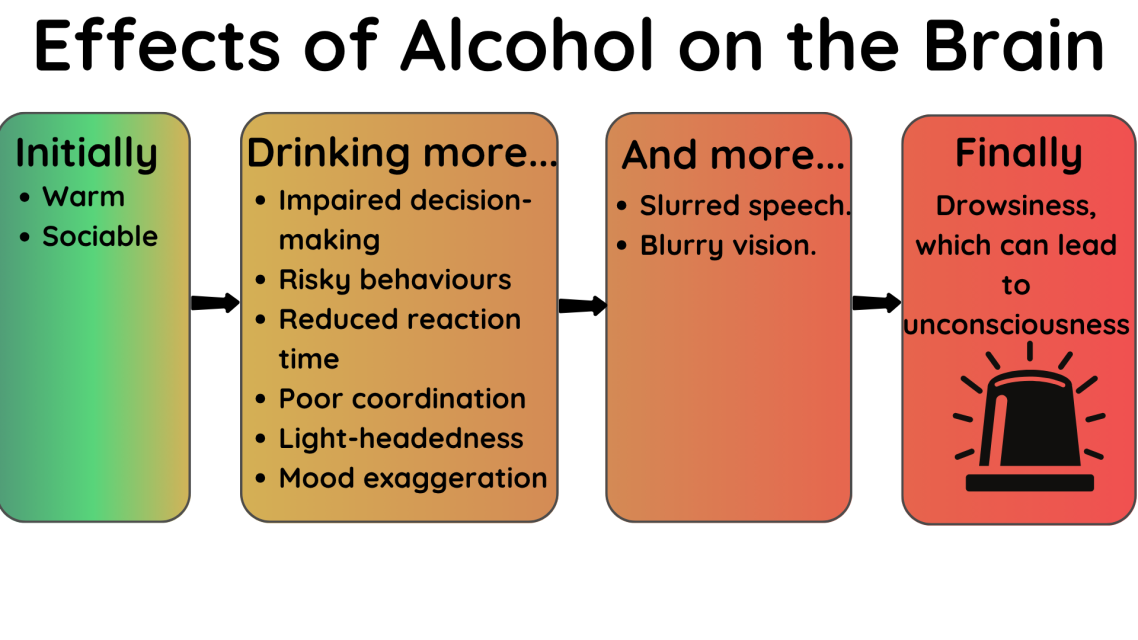Alcohol: A Guide for Children in Care
You may have tried alcohol, know someone who drinks or just be curious.
This guide answers key questions about alcohol to help you understand its effects and make informed choices.
What is Alcohol?
Alcohol comes in many forms, but the type found in drinks is called ethanol. It is produced when liquids ferment with yeast.

How Does Alcohol Affect the Body?
Alcohol quickly moves through your body and affects various organs. Drinking too much can lead to intoxication or getting drunk.
Short-Term Effects of Alcohol
Brain: Alcohol reaches the brain within minutes and its effects increase the more you drink.
- Initially: You may feel warm and sociable.
- As you drink more:
- Impaired decision-making, leading to risky behaviour such as unsafe sex.
- Reduced reaction time and coordination, making activities like driving or using tools dangerous.
- Light-headedness.
- Mood exaggeration - this can be making you excessively happy, sad or stressed.
- Further effects:
- Slurred speech.
- Blurry vision.
- Severe intoxication:
- Drowsiness, which can lead to unconsciousness. If someone is difficult to wake up, call an ambulance immediately.

Liver:
The liver removes toxins, including alcohol from the blood. Drinking too much can cause:
- Hangovers: Headaches, nausea and fatigue the next day.
- Alcohol poisoning: Vomiting, which can be life-threatening if inhaled while unconscious. Call an ambulance if you’re concerned.
Kidneys:
Alcohol increases urine production, leading to dehydration.
Long-Term Effects of Alcohol
Drinking heavily over time can cause serious health problems, including:
- Brain damage: Impaired memory and decision-making, especially harmful for developing brains.
- Liver disease: Scarring (cirrhosis) and serious illness.
- Pancreatitis: Inflammation of the pancreas, affecting digestion.
- Cancer: Increased risk of various cancers.
- Mental health issues: Depression and anxiety.
- Sexual dysfunction: Long-term problems with sexual health.

Am I Addicted to Alcohol?
Signs of alcohol addiction include:
- Feeling unable to cope without drinking.
- Prioritising alcohol over other activities.
- Continuing to drink despite negative consequences.
If you are worried about your drinking, seek help from a doctor, carer, or social worker.
How Much Alcohol Is in a Drink?
Alcohol content is measured in units:
- Pint of beer or cider: 2-3 units.
- Glass of wine: 1-2 units.
- Shot of spirits: 1 unit.
Who Can Drink Alcohol?
In the UK, only adults (18+) can buy alcohol. It is advised that children under 15 should not drink at all.
Think of alcohol like sweets for adults —it’s okay for adults in small amounts, but too much is harmful.
How Much Alcohol Is Safe to Drink?
For adults, the recommended limit is no more than 14 units per week, spread over at least three days. For children, the safest option is to avoid alcohol altogether.
Tips for Drinking Safely (for When You’re an Adult)
- Drink socially, not alone.
- Never use alcohol to cope with stress. Exercise or engage in hobbies instead.
- Set a limit and stick to it. Carry only a set amount of cash to avoid overspending.
- Avoid drinking rounds. This helps control your intake.
- Finish your drink before refilling. Prevents losing track of how much you’ve consumed.
What If Someone I Love Drinks Too Much?
It can be distressing to see someone struggle with alcohol. If this affects you, talk to a carer or social worker for support. You can learn from their experience and make healthier choices for yourself.

Alcohol and Driving
Alcohol affects coordination and judgment almost immediately.
If you are driving, avoid alcohol completely.
Mixing Alcohol with Drugs
Mixing alcohol with drugs—whether illegal substances or prescribed medication—can be extremely dangerous and even life-threatening. Always check with a doctor, carer, or pharmacist before drinking while on medication.

Finally
Alcohol is a great treat for adults in sensible amounts. But until you’re an adult it could do a lot of harm to your rapidly developing brain.
If you’re feeling bored and in need of some serious fun, have a chat with your carer and social worker. May be have a look at our blog post on Hobbies and Interests for some ideas.
If you’re feeling low or stressed then alcohol will probably just make it worse - have a chat with your carer, social worker, school nurse or GP to get some decent support that will work.
Getting Help for Alcohol Issues
If you’re worried about your drinking or someone else’s, talk to your carer or social worker. You can also find help at: Alcohol Support – NHS
Thanks for reading this blog post. The content is © copyright to Baker Baker Health. If you find this resource helpful we'd love you to share this webpage freely. If you wish to copy the content or have any comments / suggestions, please email hello@bakerbakerhealth.com and we would be delighted to help!
